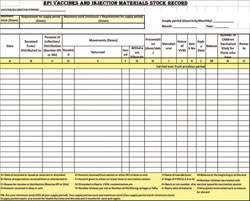
Vaccines are very expensive, so it is important to ensure that the ordered vaccines will be used and not spoiled. The World Health Organization (WHO) recommends that every order for vaccines should take into account the considerations below. There are some new terms which are explained below it.
Health facility staff should always use an EPI Vaccine and Injection Materials Stock Record to help them to:

Bundling refers to the practise of organising related stock all together in ‘bundles’ consisting of the correct numbers of all the items you need during an immunization session:
Auto-disable (AD) syringes are specially modified disposable syringes with a fixed needle; an AD syringe is automatically disabled after it has been used once, because the plunger cannot be pulled back a second time. The WHO recommends that immunization programmes use AD syringes for all vaccinations, to prevent re-use of contaminated injection equipment.
The cold chain refers to the network of refrigerators, cold stores, freezers, cold boxes and vaccine carriers, and their efficient organisation and maintenance, so that vaccines are kept at the right temperature at all times. This ensures that vaccines keep their potency during their transportation and storage at all stages, from leaving the factory to the point of administration to the target population.
Storage of vaccines is a major challenge. Vaccines are easily damaged during storage if the cold chain is not maintained. Therefore it is important to divide the vaccine supply into manageable periods for the purpose of ordering stocks. A small health facility will usually have a shorter supply period (perhaps four weeks) than a larger health facility.